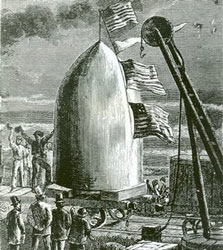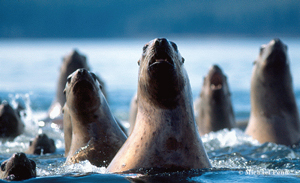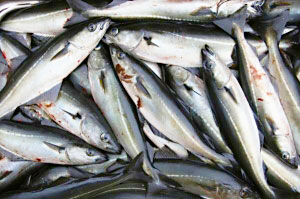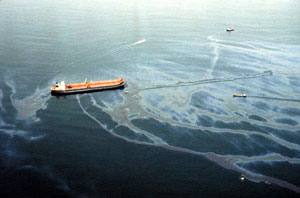Monday, November 16, 2009
Togiak herring forecast good
The Togiak sac roe herring fishery, one of the Alaska's biggest herring harvests, has really struggled the past few years. But it hasn't been for lack of fish.
– Pacific Fishing columnist Wesley Loy, writing in his blog: Deckboss
Read more: deckboss.blogspot.com
No longer Puget Sound, it’s now Salish Sea
The U.S. Board on Geographic Names has adopted the name Salish Sea for the inland waters that stretch from Olympia north to Canada's Desolation Sound.
– Seattle Times
Read more: seattletimes.nwsource.com
 Space rocket gun proposed for Adak
Space rocket gun proposed for Adak
Adak may eventually be home to a new massive gas-powered gun used for launching things into space. The new technology is being developed by physicist John Hunter and his colleagues at Quicklaunch Inc.
– Pacific Fishing columnist Anne Hillman reporting for KUCB Radio, Unalaska
Read more: www.publicbroadcasting.net/kial
To the editor: Bring back crab to Kodiak
Hundreds of crab pot vessels once fished around Kodiak. Today, fishing takes us farther away from home for much of the year. I’ve always cared about my city and I yearn for that familiar feel of a vibrant crab fishing town.
-- Lu Dochtermann, writing in the Kodiak Daily Mirror
Read more: www.kodiakdailymirror.com
California crab season open, fishermen subdued
"We're not looking for a big season this year," said Mike Ricketts, commercial fisherman and president of the Monterey Commercial Fishermen's Association. "But there's no way of knowing what's out there until we put the traps in and find out."
– Monterey County Herald
Read more: www.montereyherald.com/news
Alaskans praise catch shares to New Englanders
Coming across country, two Alaskans describing their deep, different and varied experiences in the nation's newest, biggest volume and value fishery also underscored how different their catch share system histories are from the one the New England groundfishermen have to look forward to.
– Gloucester (Mass.) Daily Times
Read more: www.gloucestertimes.com
ASMI mission to sell seafood to China
Stimulating the demand for Alaska’s seafood exports and setting the stage for business transactions were top priorities of a week-long trade mission to China conducted by the Alaska Seafood Marketing Institute (ASMI).
Read more: pressroom.alaskaseafood.org
Tuesday, November 17, 2009
Federal survey shows improvement in Steller sea lion population

In the first survey since 2005, the number of Steller sea lion pups counted on rookery trend sites increased roughly 10 percent throughout the US range of the endangered western segment of the population. The National Marine Fisheries Service reported preliminary results from surveys conducted this summer to count sea lion pups this week at meetings at the Alaska Fisheries Science Center in Seattle.
– Press release from the Marine Conservation Alliance
Read more: www.marineconservationalliance.org
End of season figures: 42,075,201 pounds of halibut gathered
The halibut fishery closed at noon Sunday after an eight-month season.
– Pacific Fishing columnist Wesley Loy, writing in his blog: Deckboss
Read more: deckboss.blogspot.com
End of season figures: 42,075,201 pounds of halibut gathered
The halibut fishery closed at noon Sunday after an eight-month season.
– Pacific Fishing columnist Wesley Loy, writing in his blog: Deckboss
Read more: deckboss.blogspot.com
13 Seattle restaurants join Alaska mine debate
The fight is on between backers of an Alaska mine being developed near the world's most productive wild salmon streams and 13 Seattle restaurants.
– Anchorage Daily News
Read more: www.adn.com/western_alaska
Calif. suction dredge mining battle heads to court
The ongoing battle over suction dredge mining is headed to federal court, as a group of miners plans to challenge a state-imposed moratorium on the practice which went into effect in August.
– Lake County News,
Read more: lakeconews.com
Wednesday, November 18, 2009
Commercial salmon harvest 11th largest in Alaska state history
The Alaska Department of Fish and Game released its preliminary estimates for this year's commercial salmon harvest and its value. Commercial fishermen harvested 161.7 million salmon this year, the 11th largest harvest since statehood. The harvest was 15 million fish higher than in 2008 and 14 million fish below the pre-season forecast.
– Juneau Empire
Read more: www.juneauempire.com
Metlakatla fishery in MSC review
The Annette Islands Reserve (AIR) salmon fishery, located in southeast Alaska, has entered full assessment to be considered for Marine Stewardship Council (MSC) certification. It is the first indigenous peoples-managed fishery to seek MSC certification. If successful, this salmon fishery will join all other Alaska salmon fisheries in being eligible to use the MSC ecolabel, which indicates fish from a sustainable and well-managed fishery.
The AIR fishery is managed by the Metlakatla Indian Community Council in conjunction with the U.S. Bureau of Indian Affairs. It is the only tribally-managed fishery in the state of Alaska. Settled in 1887 by Trimshian peoples from what is now British Columbia, Canada, the Annette Island Reserve was established as a federal Indian reservation by U.S. presidential proclamation in 1891.
– Marine Stewardship Council
Read more: www.msc.org
 NOAA scientists offer pollock assessment
NOAA scientists offer pollock assessment
This week NOAA fisheries researchers presented scientific information to the North Pacific Fishery Management Council's Groundfish Plan Team that will underpin later decisions on harvest levels for Eastern Bering Sea pollock.
The scientific analysis points toward a 2010 allowable biological catch of Eastern Bering Sea pollock that would be similar to the allowable biological catch that was set for 2009—815,000 tons.
Greenpeace again knocks pollock fishery
Scientists charged with evaluating the sustainability of fishing limits for the billion-dollar Alaska pollock fishery recommended a slight decrease in the harvest for 2010. Although long-touted as one of the world’s “best managed” resources by industry officials, pollock populations have declined over 60 percent in the past seven years, and 73 percent since 1988, forcing managers to scale back the maximum allowable catch, though by less than some scientists and environmentalists say is needed.
In a split decision, the Plan Team voted to recommend a maximum catch for 2010 of 813,000 tons. Two Plan Team members shared Greenpeace's view that a maximum catch of 413,000 tons was more appropriate given the poor state of the pollock population.
– Greenpeace press release
Read more: www.greenpeace.org
California fishermen find more crabs than expected
Despite a grim outlook that local crabs were unusually small this year, which would have prevented crabbers from legally catching them, commercial fishermen found plenty of regulation-size crabs in the sea and started selling them as early as Sunday night.
The crabs this year are small — most no more than two pounds. But their mere presence is a great consolation to crabbers after last year's hugely disappointing season.
-- Son Jose Mercury News
Read more: www.mercurynews.com
Oregon clarifies commercial crab regulations
The Oregon Department of Fish and Wildlife is sending a notice to all commercial Dungeness crab permit holders clarifying that there will be no new regulations or special enforcement plans for crab pot release mechanisms in the 2009-2010 season. The current Dungeness crab gear rule will remain in effect during the upcoming season.
– ODFW press release
Read more: www.dfw.state.or.us/news
Scotland’s wild fish interests criticize WWF stance on farmed salmon
Representatives of Scotland’s wild fish interests have condemned the salmon dialogue process backed by WWF, saying it is naïve, vague and without teeth.
Scotland’s leading wild fish interests have issued a highly critical response to proposals by the international conservation organization WWF, to accredit salmon farm companies with “environmentally, socially and economically responsible” operations.
-- FishNewseu.com
Read more: www.fishnewseu.com
80-year-old classification error may lead to skate species extinction
A species of common skate is to become the first marine fish species to be driven to extinction by commercial fishing, due to an error of species classification 80 years ago, reveals research published November 17 in the journal Aquatic Conservation.
-- Science Daily
Read more: www.sciencedaily.com
Thursday, November 19, 2009
NOAA scientists offer pollock assessment
(Editor’s note: Because of an error in production, the link to NOAA’s press release announcing the 2010 scientific analysis for pollock was omitted in Wednesday’s Fish Wrap. We’re submitting the item again, with the link.)
This week NOAA fisheries researchers presented scientific information to the North Pacific Fishery Management Council's Groundfish Plan Team that will underpin later decisions on harvest levels for Eastern Bering Sea pollock.
The scientific analysis points toward a 2010 allowable biological catch of Eastern Bering Sea pollock that would be similar to the allowable biological catch that was set for 2009—815,000 tons.
Read more: mail.google.com
 Major Exxon Valdez payments near distribution
Major Exxon Valdez payments near distribution
In the next few weeks, fishermen harmed by the 1989 Exxon Valdez Oil Spill should start receiving their biggest settlement payout yet. Lawyers representing the plaintiffs have worked since December through a cumbersome process to distribute $383 million in punitive damages. Now the lawyers are preparing to distribute an even bigger sum – $470 million – in the next several weeks.
– Homer Tribune
Read more: homertribune.com
Wrangell man, 56, dies after falling overboard
Alaska Commercial Fisheries Entry Commission records show the boat named in the press release belonged to the deceased. It's not clear what the 32-footer was fishing for, but the records indicate it's rigged for longline and pot gear.
-- Pacific Fishing columnist Wesley Loy, writing in his blog: Deckboss
Read more: deckboss.blogspot.com
Fish consumers may be getting tricked, new study shows
Canadian consumers should think twice about paying a premium to eat high-end fish because it could actually be a cheap substitute, according to a new cross-country fish investigation spearheaded by high-school students. One in four fish samples taken from restaurants, supermarkets and fish markets across the country was mislabelled or misidentified as higher-priced or more desirable fish species, according to University of Guelph biology professor Robert Hanner, who released the results yesterday at an international conference in Mexico City.
- Canada.com
Read more: www.canada.com
North Coast Calif. crab season could be busy
Commercial crab season will begin Dec. 1 as usual, but it may be a bit crowded out there.
Due to a poor opening for the Central Coast commercial crab season, which began Nov 15, North Coast boats will be having to compete with vessels from down south for what may be another low-yield harvest.
Read more: www.triplicate.com
Researchers: Consumer campaigns not helping threatened species
Consumer campaigns to protect threatened fish species have failed, researchers warned in a report underscoring the need for alternative ways to save threatened marine species.
– Sit News, Ketchikan
Read more: pub34.bravenet.com
Port Townsend boat pier asked to post load limits
The State Department of Labor & Industries has asked the Port of Port Townsend to post maximum safe load limits on a Boat Haven pier or face a penalty of $320.
The pier is used by New Day Fisheries, a fish purchasing and processing company, to haul fish off commercial vessels.
– Peninsula Daily News
Read more: www.peninsuladailynews.com
Friday, November 20, 2009
Icicle hit with $1.5 million verdict
A jury in Seattle awarded $1.5 million to man injured aboard a fish-processing vessel. The Seattle Times reports the King County jury on Monday found that Icicle Seafoods failed to pay for medical care for 55-year-old Dana Clausen.
– The Olympian, Olympia, Wash.
Read more: www.theolympian.com
Gloucester, Mass. processor helps bring Alaska fish to
school cafeterias nationwide
The golden chunks of fried, frozen fish speeding off conveyor belts at Good Harbor Fillet's Gloucester plant are the company's bet on bringing seafood back to school cafeterias.
The frozen fish processor, whose business plan has included revolutionizing the fish stick, is getting a new boost from the federal government to reach a generation often suspicious of eating things that come from the ocean.
After a year of lobbying by Good Harbor, the U.S. Department of Agriculture this week announced that it will start buying frozen Alaska pollock in a commodity program that puts discounted food in school kitchens across the country.
– Gloucester Daily Times
Read more: www.gloucestertimes.com
Another look at sea lion report
On Tuesday, Fish Wrap carried an item headlined, “Federal survey shows improvement in Steller sea
lion population.”
But Pacific Fishing’s columnist in Unalaska, Anne Hillman, wrote to say the item went too far. Here’s Anne:
“I noticed in Fish Wrap you included a press release on sea lion pup populations, which was completely misleading in that it was a 10 percent increase over four years and isn’t statistically significant.
Really, they can only say that the population is stabilizing. You may want to include this link in your next wrap.”
Read more: www.publicbroadcasting.net
Official’s gillnet comments spark anger in Wahkiakum County
In a sharp letter to Gov. Chris Gregoire, two Wahkiakum County commissioners are blasting the chairwoman of the state Fish and Wildlife Commission, whose recent comments on Columbia River salmon fishing amount to “a doomsday address” for lower river gillnet fishermen, in the words of one commissioner.
Wildlife Commission Chairwoman Miranda Wecker distorted facts and admitted the commission favors sports fishermen over commercial fishermen a during an Oct. 12 presentation to officials from four lower river counties, according to commissioners.
– The Daily News, Longview, Wash.
Read more: www.tdn.com
Judge signals dissatisfaction with Obama plan for Oregon dams
On Monday comes the latest in the long-running court battle over the government's plan to run its hydroelectric dams without pushing Columbia Basin salmon closer to extinction. And based on recent letters he's issued, U.S. District Court Judge James Redden is not altogether satisfied with what the Obama administration is proposing.
– The Oregonian
Read more: www.oregonlive.com
Should culling be considered for salmon-consuming seals?
I am told seals eat their weight in fish every day. I don't know if that's true, but isn't it safe to assume they are a significant factor in salmon stocks depletion. Shouldn't seals be culled?
– Times Colonist, Victoria, BC
Read more: www.timescolonist.com
Oregon’s Territorial Sea Plan nears agreement
“The difference between the right word and the almost right word is the difference between lightning and a lightning bug.” Mark Twain’s irrefutable wisdom bobbed to the surface in early November as state officials neared a decision on the final iteration of a vital amendment to Oregon’s Territorial Sea Plan (TSP). The amendment pertains to the use of the state’s ocean waters (extending from the shoreline to three nautical miles out) for renewable energy facilities, more commonly known as wave energy parks.
– Newport News
Read more: www.newportnewstimes.com
Clayoquot Sound salmon numbers alarm fish counters
Returns of two West Coast salmon stocks are so low this year, they're headed on the path to local extinction, fish counters say. Numbers of chinook in Clayoquot Sound and sockeye in Kennedy Lake have been seriously declining for the last ten years, but Doug Palfrey, a fish counter contracted by Fisheries and Oceans Canada (DFO) to do counts in both areas, said this year is the worst yet.
– Canada.com
Read more: www.canada.com



 Space rocket gun proposed for Adak
Space rocket gun proposed for Adak
 NOAA scientists offer pollock assessment
NOAA scientists offer pollock assessment Major Exxon Valdez payments near distribution
Major Exxon Valdez payments near distribution